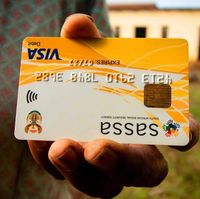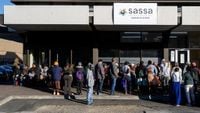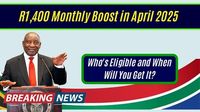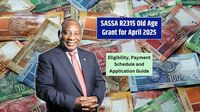As May 2025 begins, beneficiaries of the South African Social Security Agency (SASSA) are once again checking their grant payment statuses, particularly with the new R370 Social Relief of Distress (SRD) grant increase now in full effect. Google search trends show a massive demand for terms like “SASSA status check,” “May payment dates,” and “R350 to R370 grant.” According to SASSA, Older Persons Grants will be paid first in early May 2025, followed by Disability Grants and then the SRD R370 grants. However, many applicants have reported delays or “pending” statuses on the SASSA portal.
In April 2025, SASSA confirmed that the Old Age Grant has increased from R2,110 to R2,315 per month. This change provides much-needed relief for millions of older South Africans struggling to keep up with rising living costs. The R2,315 grant is a monthly financial benefit provided by the government to support older citizens who have little or no income. Administered by SASSA and funded by the Department of Social Development, this grant aims to help seniors afford necessities such as food, transport, electricity, and healthcare.
The increase in April 2025 is part of a broader effort to support the elderly amid inflation and rising living costs. According to SASSA, the eligibility age for the Old Age Grant is 60 years and older. The income limit for a single applicant is R86,280 per year (R7,190/month), while the asset limit is R1,227,600. For married couples, the income limit is R172,560 per year (R14,380/month) with an asset limit of R2,455,200 (combined).
Applications for the Old Age Grant can be submitted in person or through a representative, and the process is free of charge. Applicants must provide necessary documents, including a valid South African ID, proof of residence, and bank statements. SASSA typically takes up to 90 days to process applications, and payments are made at the beginning of each month, with Older Persons Grants paid first.
In addition to the Old Age Grant, SASSA is set to provide a R1,400 monthly boost to eligible citizens starting in April 2025. This initiative aims to alleviate financial hardships faced by many South Africans due to ongoing economic challenges. The R1,400 monthly boost is designed for South Africans who are unemployed or earning below a certain income threshold. To qualify, applicants must be between 18 and 59 years old, earning below the national minimum wage (currently R4,473 per month), and not receiving any other social grant from SASSA.
The application process for the R1,400 monthly boost is straightforward and can be completed online. Applicants must submit necessary documentation, including proof of income or unemployment status. The deadline for applications is April 30, 2025, with payments starting on May 15, 2025.
Despite these positive developments, significant challenges remain. A recent report by the Institute of Economic Justice (IEJ) revealed that nearly half of the R370 SRD grant recipients are not paid regularly. The report found that millions are excluded from the SRD grant due to a lack of knowledge about the application process and flawed eligibility criteria. According to the IEJ, about 44.5% of grant beneficiaries did not receive payment regularly due to banking and administrative issues.
The report highlighted that 18 million people are eligible for the SRD grant, yet only 8 million have been approved since April 2022, when the new qualifying criteria came into effect. Many eligible individuals were unaware of how to apply or believed they did not qualify. The application process has been criticized for potentially misleading applicants, with many stating they have means when they do not.
In January 2025, High Court Judge Leonard Twala ruled that the regulations limiting access to the grant are unconstitutional and ordered the government to increase the grant amount and the income threshold to qualify for it. The report indicated that 80% of rejection decisions were based on alternative income sources identified by SASSA, which often includes funds that should not disqualify applicants.
For many, the SRD grant is a lifeline. Samuel Ndlama, a 35-year-old from Zimbabwe on refugee status in South Africa, expressed his frustration after being denied assistance despite his financial struggles. “I had to find a way because I’m a construction worker and I go where there is a job. I applied for the grant, but government officials said I was not eligible because I had an alternative source of income, which I did not have,” he said.
As the government continues to review the SRD grant system, it remains crucial for beneficiaries to keep their information up to date and to be aware of their rights. SASSA has emphasized the importance of ensuring that all beneficiaries’ details are accurate to avoid payment delays.
April 2025 marks a hopeful chapter for social grant recipients in South Africa. With increases applied across all permanent grants and strong commitments from the government to protect the system, millions will now receive a bit more financial help each month. Even as challenges remain, these updates bring renewed assurance that the country continues to prioritize support for its most vulnerable citizens.





